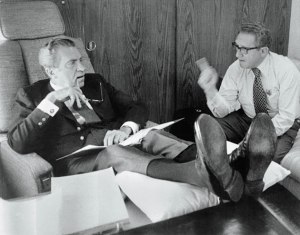This is the second post of a four-part series on India-Pakistan 1971 War. First part can be read here
Six days after Pakistan Army began massacring its own people, a meeting on the East Pakistan Crisis was held in the White House Situation Room. It was chaired by Henry Kissinger, the US National Security Adviser and President Richard Nixon’s right-hand man when it came to the American foreign policy. Kissinger, a former Harvard academic, was brilliant, ruthless and extremely powerful. Perhaps the most controversial figure in the American foreign policy of the time, he was an ardent worshipper of realpolitik in foreign policy, which often translated to celebrating cold-blooded calculations.
On this day, the calculation was about East Pakistan and Yahya Khan. A week into the crisis, Kissinger and his boss, Nixon, had already made up their mind to stay out. Despite the mounting reports of a bloodbath coming in from their own consulate in Dacca, the mood in White House was to let Yahya do what he wanted. In the meeting, Kissinger’s main concern was whether Pakistan Army could actually succeed or not. As the meeting progressed, Kissinger asked about the people killed in Dacca University. “Did they kill Professor Razak? He was one of my students.” He was informed by a CIA official that Razak probably had been killed. Kissinger, apparently referring to the previous rulers of South Asia, replied, “They didn’t dominate 400 million Indians all those years by being gentle.”
This detached statement perfectly represented the American attitude towards the East Pakistan genocide. And it was about to get worse. Within a month, US will shed its disinterested neutrality and will actively begin aiding Pakistan in the massacre. Why? Because Nixon and Kissinger were secretly working on a project to change the world.


